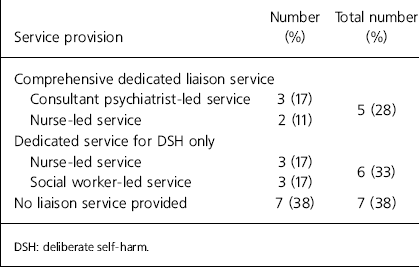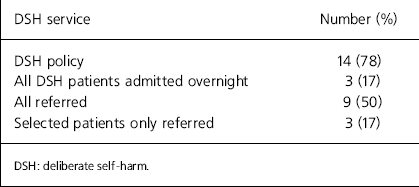Liaison psychiatry services have an important role to play in the management of patients in the general hospital setting. Psychiatric morbidity has been shown to be high in patients in general hospitals. Up to 35% of new referrals to neurology, cardiology and gastroenterology out-patient clinics have a non-organic cause for their symptoms (Reference Hamilton, Campos and CreedHamilton et al, 1996) and 20% of male in-patients have an alcohol-related illness (Reference Feldman, Mayou and HawtonFeldman et al, 1987). Without effective liaison psychiatry input, the high level of psychiatric morbidity in general hospitals often goes undetected and untreated. The economic implications are vast for repeated assessments of patients more appropriately managed by a liaison psychiatry team (Royal College of Physicians & Royal College of Psychiatrists, 1995).
Deliberate self-harm (DSH) is a major public health concern, and suicide rates have been targeted by the government (Department of Health, 1998). Specialist DSH teams significantly improve the quality of psychosocial assessment (Reference Whyte and BlewettWhyte & Blewett, 2001). However, a recent study revealed that only around 50% of DSH patients are assessed by such teams (Reference Slinn, King and EvansSlinn et al, 2001).
The need for dedicated liaison services has been highlighted repeatedly, including in a joint report published by the Royal College of Physicians and the Royal College of Psychiatrists (1995). The Royal College of Psychiatrists recommends 0.5-1 full-time equivalent (FTE) liaison psychiatry consultant per general hospital (Royal College of Physicians & Royal College of Psychiatrists, 1995), but previous surveys reveal that national numbers of posts fall far below this level, severely limiting service provision and training opportunities (Reference GuthrieGuthrie, 1998; Reference Mayou and LloydMayou & Lloyd, 1985; Reference Mayou, Anderson and FeinmannMayou et al, 1990). In a recent survey of the 122 senior house officer (SHO) rotations, only 45.5 SHO posts in liaison psychiatry were identified nationally (Reference Burlinson and GuthrieBurlinson & Guthrie, 2001) and, geographically, they were spread unevenly. Current teaching emphasises the importance of integrated and comprehensive health care, giving a holistic approach, and with their emphasis on the biopsychosocial model, liaison psychiatry services are well placed to deliver this.
This survey was designed to give baseline figures of current service for the Regional Psychiatric Advisory Committee. Particular reference was made to DSH in view of specific guidelines for these services and national targets for suicide prevention. Previous surveys have shown patchy provision, which rarely meets Department of Health and College guidelines (Reference Mayou and LloydMayou & Lloyd, 1985; Reference Mayou, Anderson and FeinmannMayou et al, 1990; Reference Slinn, King and EvansSlinn et al, 2001). In contrast to these studies, we targeted our survey at consultants in medicine and accident and emergency, as well as psychiatrists, giving a broader view of current services and insight into how these services are perceived.
Method
All clinical directors in medicine, accident and emergency and mental health in the south-west of England were identified from Binley's Directory of NHS Management (2001). A questionnaire was distributed to them in July 2001. This questionnaire asked:
-
1. Is there a dedicated liaison service and if so, who provides it?
-
2. How is a psychiatric opinion accessed?
-
3. Is there a DSH policy, who is referred for psychiatric assessment, and is every patient admitted who presents out-of-hours?
-
4. Free text comments?
Copies of their DSH protocols were also requested.
Results
Eighteen trusts providing acute medical and accident and emergency services were identified. Three acute services trusts also provided mental health services; the remaining 15 contracted services from eight specialist mental health trusts.
A total of 47 questionnaires were distributed and 36 were returned, a response rate of 77%. Responses were received from all but one acute service trust, and from all but one mental health services trust.
Across the south-west, there are three consultants in liaison psychiatry, each contracted for between three and six liaison psychiatry sessions. There is also one full-time staff grade post. No training posts were identified. In addition, there are liaison nurses or nurse consultants in eight trusts (44%) and DSH social workers in four trusts (22%).
The principal findings are given in Table 1. Numbers and percentages refer to the 18 trusts providing acute medical and accident and emergency services.
Table 1. Liaison psychiatry service provision

| Service provision | Number (%) | Total number (%) |
|---|---|---|
| Comprehensive dedicated liaison service | ||
| Consultant psychiatrist-led service | 3 (17) | 5 (28) |
| Nurse-led service | 2 (11) | |
| Dedicated service for DSH only | ||
| Nurse-led service | 3 (17) | 6 (33) |
| Social worker-led service | 3 (17) | |
| No liaison service provided | 7 (38) | 7 (38) |
A dedicated liaison psychiatry service was taken to mean an identified professional providing a consistent and regular psychiatric service for all patient groups. Of the five trusts with a dedicated liaison service, three have dedicated consultant sessions. The other two services are provided by nurses and are almost exclusively for DSH. The remaining three nurse-led services and the three services provided by social workers alone are for DSH only.
The findings regarding DSH are given in Table 2. The numbers and percentages are again for trusts providing acute medical and accident and emergency services.
Table 2. Services for deliberate self-harm

| DSH service | Number (%) |
|---|---|
| DSH policy | 14 (78) |
| All DSH patients admitted overnight | 3 (17) |
| All referred | 9 (50) |
| Selected patients only referred | 3 (17) |
In three trusts, all patients are admitted and referred in working hours. In nine trusts, all patients are referred but some will be allowed home and a written referral will be collected from the accident and emergency department the following day by a DSH nurse or social worker. In three trusts, selected patients only are referred and a formal protocol for selection, in some instances based on a scoring system (e.g. seasonal affective disorder person), is followed by accident and emergency staff.
Two trusts detailed active plans for future service development and a further eight indicated ongoing discussions. Three trusts felt lack of money was a serious obstacle to future plans. In five trusts, a new service had been introduced in the 12 months preceding the survey.
Comments were made by 31 respondents (86%). These were from all three groups of clinicians. Many expressed strong feelings, both positive and negative. Broadly speaking, from the medical and accident and emergency respondents, seven were critical or strongly critical and three were positive. Ten were planning or would like a service.
Selected comments
-
• ‘The current service to our general hospital is very poor. They deserve better and have worked up a proposal for a liaison mental health service. The health authority is reluctant/not interested in funding’ (MH).
-
• ‘Psychiatry service appalling (not blaming the psychiatrists necessarily)…. A&E probably abuses the psychiatry service by asking for unnecessary psych opinions but this could be rectified by better education which would be part of a liaison service’ (A&E).
-
• ‘Excellent invaluable service’ (A&E).
-
• ‘There is a dire need for liaison psychiatry in our hospital. It would unblock beds, expedite discharge and improve service to patients’ (Medicine).
Discussion
The presence of even so few liaison psychiatrists in the region is an improvement over the situation in 1990 (Reference Mayou, Anderson and FeinmannMayou et al, 1990). However, it is still the case that only a minority of trusts have access to a comprehensive dedicated service, the bulk of the services being provided by on-call staff and locality teams. DSH fares rather better, with a number of non-medical professionals providing a dedicated service in some trusts. Despite this, it is clear that Department of Health (Department of Health and Social Security, 1984) guidelines for a psychosocial assessment of every case of DSH are not being universally met in the south-west.
Psychiatric morbidity is common in all areas of a general hospital. Clinicians perceive the need for psychiatric input in some cases, but a proactive service is required to identify other patients who would also benefit. The geographical and administrative separation of mental health and general medical services increases the need for a specialist service provided by dedicated staff, based in the general hospital. Over 80% of the acute service trusts contracted mental health services from separate mental health trusts, complicating the provision of a comprehensive and flexible liaison psychiatry service. Sectorisation of mental health services has been identified in the past as an obstacle to referral (Reference Mayou, Anderson and FeinmannMayou et al, 1990). Removal of mental health into specialist trusts may also have a similar effect and be a barrier to relations between psychiatrists and other clinicians (Reference LloydLloyd, 2001). Responsibility for financing a liaison psychiatry service may also be disputed.
The high return rate for questionnaires and the comments made imply that there is considerable interest in liaison psychiatry services. By surveying consultants in medicine and accident and emergency, the results give an insight into how services are perceived. Many clinicians in the general hospitals perceive a need for a service and can appreciate its benefits for their practice. The lack of a service arouses considerable anger in some cases. Psychiatrists themselves are sometimes perceived as being obstructive and uninterested, with rigid referral systems and elusive staff. Finances and resources are frequently cited as problems which make it impossible to put plans into practice. From local knowledge, we are aware of inconsistencies and these no doubt exist across the region. There is clearly a need for better communication and education. Whatever the intentions of the psychiatrists, the service received by patients will depend on the ability of clinicians to refer them appropriately.
Liaison psychiatry services are an essential part of any comprehensive medical service. Specialist posts are needed, as per College recommendations, and doctors need to be trained to fill these. Liaison psychiatry remains under-resourced and under-prioritised by both general and mental health trusts. The lack of significant change over a number of years, despite surveys showing the shortfall in service provision, must not be allowed to continue.
Declaration of interest
None.





eLetters
No eLetters have been published for this article.